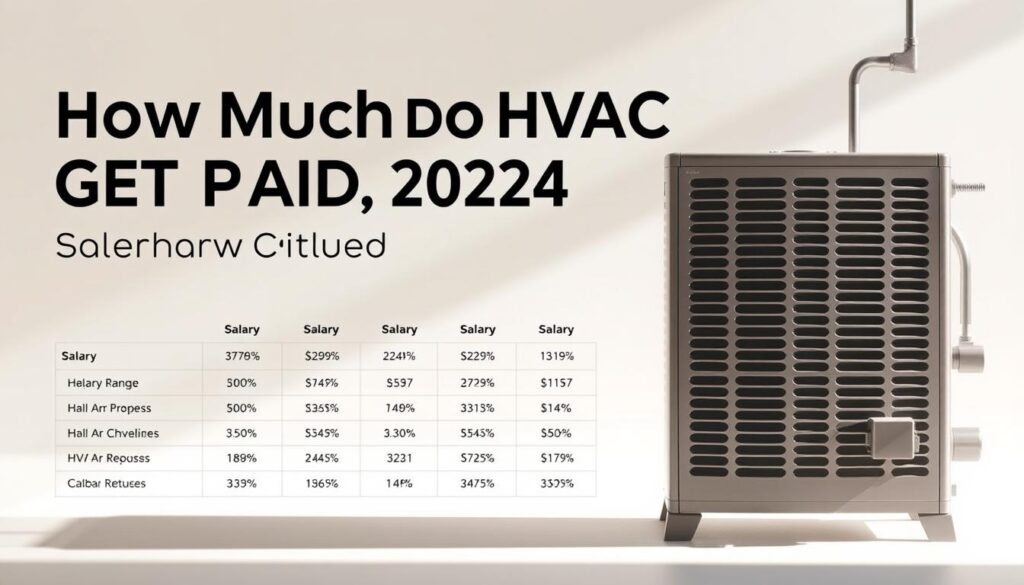Affiliate Disclosure
HVAC Guide Guys is a participant in the Amazon Services LLC Associates Program, an affiliate advertising program designed to provide a means for sites to earn advertising fees by advertising and linking to Amazon.
How Much Do HVAC Get Paid? Are you curious about how much HVAC technicians really earn in 2024? Imagine turning your technical skills into a lucrative career. This career offers financial stability and growth.

The HVAC technician salary landscape is more exciting than you might expect. In 2024, professionals in this field can earn an average of $49,500 annually. Top performers can even break the $100,000 barrier. Understanding how much HVAC technicians get paid requires exploring various factors that influence their earning.
Your path in the HVAC industry could be more rewarding than many traditional career routes. Whether you’re just starting or looking to advance your skills, the opportunities for substantial income are remarkable.
Key Takeaways
- Average HVAC technician salary reaches $49,500 in 2024
- Skilled professionals can earn over $100,000 annually
- Career offers strong financial growth
- Multiple factors impact HVAC technician salary
- Technical expertise directly correlates with earning power
Table of Contents
Understanding HVAC Technician Career Prospects
The HVAC industry is full of exciting opportunities for those looking for a stable and rewarding career. With a growing demand and promising job market, your HVAC career can lead to great professional growth and high earnings.
The HVAC job market is looking very promising for skilled technicians. The U.S. Bureau of Labor Statistics shows a bright future for the industry.
Current Industry Growth and Demand
HVAC industry wages are strong, with a lot of job growth expected. Here are some key points:
- Over 415,000 HVAC worker jobs in 2022
- Projected 37,000 new jobs by 2024
- Consistent annual growth rate of 5%
Job Security in HVAC Field
Your HVAC career is very stable. The need for climate control systems in homes and businesses keeps growing. This means there will always be a demand for skilled technicians.
| Job Sector | Growth Projection | Average Annual Openings |
|---|---|---|
| Residential HVAC | 4.5% | 12,500 |
| Commercial HVAC | 6.2% | 18,700 |
| Industrial HVAC | 5.8% | 6,200 |
Career Development Opportunities
HVAC careers have many paths for growth. You can focus on:
- Residential systems
- Commercial refrigeration
- Industrial climate control
- Green technology installations
By always learning and getting advanced certifications, you can increase your earnings and move into higher-paying roles.
How Much Do HVAC Get Paid Across the United States
Understanding hvac job salaries across the United States is key for those in the heating, ventilation, and air conditioning field. The national hvac worker compensation shows a promising career for skilled technicians.
In 2024, HVAC technicians can earn about $49,500 a year. This wage is competitive, showing the value of their specialized skills and technical knowledge.
- Base Salary: $49,500 per year
- Net Income After Taxes: Around $41,533
- Hourly Rate: Approximately $23.80
Your earnings can change based on several important factors:
- Where you live
- How long you’ve been working
- Any specialized certifications you have
- The demand for your services
Remember, hvac job salaries aren’t just about the base pay. Many technicians also get extra money for overtime, bonuses, and benefits.
The HVAC industry offers stable and rewarding careers for those who improve their technical skills and keep up with new technologies.
Explore Our HVAC Shop
Looking for top-rated HVAC tools, parts, and accessories? Visit our shop and find the perfect solution for your needs.
Visit the ShopTop-Paying States for HVAC Technicians
Some states pay HVAC technicians more than others. These top-paying areas offer great chances for skilled technicians to increase their earnings.
Knowing how salaries vary by region is key to planning your HVAC career. Where you work greatly affects how much you can earn.
California: A Lucrative HVAC Market
California tops the list with an average salary of $59,200 for HVAC techs. The state’s big construction projects and high living costs lead to these high wages. Techs in big cities like Los Angeles and San Francisco can earn even more.
- Average annual salary: $59,200
- High demand in urban centers
- Robust construction and technology sectors
New Jersey: Northeast Opportunity
New Jersey is a great place for HVAC techs, with an average salary of $58,300. Being close to big cities and having a dense population means there’s always a need for skilled HVAC workers.
- Average annual salary: $58,300
- Close to major metropolitan areas
- Diverse industrial and residential markets
Washington: Pacific Northwest Opportunity
Washington is the third highest-paying state, with an average salary of $58,000. The state’s growing tech industry and focus on green energy mean there’s always a need for efficient HVAC systems.
- Average annual salary: $58,000
- Strong technology sector
- Focus on energy-efficient systems
By aiming for these high-paying states, you can increase your HVAC career earnings and find exciting job opportunities.
Entry-Level HVAC Technician Salaries
Starting as an HVAC technician is exciting and can be financially rewarding. The salary for entry-level HVAC installers varies a lot by location. It’s important to know what you can earn in this field.
New HVAC techs can look forward to good starting salaries, more so in big cities. Places like San Francisco and New York City offer some of the best pay for newbies.
Salary Breakdown for New HVAC Technicians
| City | Annual Salary | Hourly Rate |
|---|---|---|
| San Francisco | $64,200 | $30.87 |
| New York City | $60,600 | $29.13 |
| Chicago | $55,300 | $26.59 |
| Los Angeles | $57,800 | $27.79 |
Several things can affect your starting salary and how much you can earn:
- Educational background
- Professional certifications
- Geographic location
- Specialized technical skills
Pro tip: Getting extra certifications and keeping up with new skills can really help your starting salary in HVAC.
The HVAC field offers promising career prospects for those willing to develop their skills and expertise.
Explore Our HVAC Shop
Looking for top-rated HVAC tools, parts, and accessories? Visit our shop and find the perfect solution for your needs.
Visit the ShopExperience-Based Salary Progression
Your HVAC technician salary can grow a lot as you get more experience and skills. Knowing how salaries increase helps you plan your career and set earning goals.
The earnings for HVAC careers show a clear rise with more years of experience. As you learn more and get better at your job, you become more valuable in the market.
Entry-Level HVAC Technician Earnings
At the start of your HVAC career (0-2 years), you can earn about $54,100 a year. This works out to about $26.01 an hour. Entry-level jobs usually involve:
- Basic system installations
- Assisting senior technicians
- Learning standard maintenance procedures
Intermediate HVAC Technician Salary
After 2-4 years, your salary goes up to $65,700 a year, or about $31.59 an hour. At this level, you’ll tackle more complex tasks and learn specialized skills.
- Independent system diagnostics
- Advanced repair techniques
- Customer communication skills
Senior-Level HVAC Technician Compensation
At the senior level (4-7 years), you can earn around $77,200 a year, or $37.12 an hour. Senior technicians get more responsibility and are recognized more.
- Complex project management
- Technical training responsibilities
- Advanced troubleshooting expertise
Continuous learning and professional development are key to reaching your highest earning in HVAC.
Highest Paying Metropolitan Areas

Looking at hvac job salaries, some cities really stand out. They offer top worker compensation. Your pay can change a lot based on where you work in HVAC.
San Francisco is at the top with great HVAC technician salaries. This is thanks to its strong tech and construction sectors. New York City is close behind, with big pay packages to match its high living costs and complex needs.
- San Francisco: Highest average HVAC salaries in the United States
- New York City: Extensive commercial and residential HVAC opportunities
- Newark, NJ: Strong industrial HVAC job market
- Seattle: Growing tech-driven construction landscape
- Bridgeport, CT: Steady demand for skilled HVAC professionals
The size of a city affects hvac worker pay in a complex way. Bigger cities usually pay more. This is because they have more demand, complex systems, and more competition for skilled workers.
Your earnings can change a lot based on local economy, industry, and your skills. Looking into specific cities can help you find the best HVAC jobs for your career.
Explore Our HVAC Shop
Looking for top-rated HVAC tools, parts, and accessories? Visit our shop and find the perfect solution for your needs.
Visit the ShopFactors Affecting HVAC Technician Salaries
Understanding HVAC technician salaries involves looking at many factors. Your salary isn’t just about one thing. It’s about a mix of your skills and the job market.
Several key factors affect HVAC technician wages. These factors can change how much you earn. Let’s look at what makes salaries different for HVAC technicians.
Geographic Location Impact
Where you work greatly affects your salary. Different places have different pay levels. This is due to:
- Local demand for HVAC services
- Cost of living variations
- Regional economic conditions
- Population density and infrastructure development
Industry Experience Dynamics
Your experience level directly affects your salary. The more you work, the more you earn. This is because you gain more skills and value.
| Experience Level | Salary Range | Potential Growth |
|---|---|---|
| Entry-Level (0-2 years) | $35,000 – $45,000 | Basic skill development |
| Mid-Level (3-5 years) | $45,000 – $65,000 | Specialized skill acquisition |
| Senior-Level (6+ years) | $65,000 – $85,000 | Expert knowledge premium |
Technical Certifications Value
Getting professional certifications can really boost your salary. Specialized credentials show you’re an expert. This makes you more appealing to employers.
- EPA Section 608 Certification
- NATE (North American Technician Excellence) Certification
- HVAC Excellence Certifications
- Manufacturer-specific training programs
By improving your skills, understanding the job market, and keeping learning, you can increase your salary. This will help you build a strong career.
HVAC Salary Comparison with Other Trades
Exploring career options in skilled trades? Knowing about HVAC technician salaries is key. The HVAC field offers good pay, matching or beating other technical jobs.
Let’s look at how HVAC salaries stack up against other trades:
- HVAC Technicians vs. Plumbers
- HVAC techs start off a bit higher than plumbers
- HVAC median starting salary: $54,100
- Plumbers start at $53,900
- HVAC Technicians vs. Electricians
- Electricians start higher
- Electrician entry-level: $60,600
- HVAC tech entry-level: $54,100
Your HVAC salary depends on skills, certifications, and where you work. While starting pay might vary, HVAC jobs offer growth and steady demand.
Skilled trades offer stable, rewarding careers with room to grow and specialize.
The HVAC field is growing fast, making it a great choice for technical careers. It offers good pay and long-term prospects.
Explore Our HVAC Shop
Looking for top-rated HVAC tools, parts, and accessories? Visit our shop and find the perfect solution for your needs.
Visit the ShopAdditional Income Opportunities in HVAC
HVAC technicians can earn more than their regular salary. They have many ways to increase their income. Knowing these can really help you make more money in the HVAC field.

Smart HVAC pros use different ways to make more money. Your skills can lead to many earning chances. These chances go beyond just your regular pay.
Performance Bonuses
Many HVAC companies give bonuses for good work. These bonuses reward things like:
- High customer satisfaction ratings
- Fast and efficient service
- Selling more services
- Meeting monthly goals
Overtime Pay
Peak seasons in HVAC mean more overtime. Summer and winter months are busy. This leads to:
- More money for extra hours
- Time-and-a-half or double-time pay
- More money each year
Commission Structures
Commission-based earnings can really boost your income. Experienced technicians can make a lot more money from:
- Selling equipment
- Installing systems
- Negotiating service contracts
“Strategic HVAC professionals treat their career like a business, constantly seeking opportunities to increase their value and income.” – HVAC Industry Expert
By understanding and using these income chances, you can make your HVAC career very profitable. It can bring in a lot of money.
Benefits and Compensation Packages
Understanding hvac worker compensation is more than just the base salary. Top HVAC employers know that great benefits packages are key. They help attract and keep skilled technicians in a tough job market.
Your hvac professional pay scale includes many benefits. These packages aim to give you financial security and support. They are made for hardworking HVAC professionals.
- Health Insurance Coverage
- Medical plans
- Dental coverage
- Vision care options
- Retirement Planning
- 401(k) matching programs
- Pension plans
- Investment opportunities
- Additional Compensation Benefits
- Performance bonuses
- Paid time off
- Professional development funding
Pro Tip: Always negotiate your total compensation package, not just your base salary.
“The right benefits can be worth thousands in additional value beyond your annual wages” – HVAC Industry Expert
Many HVAC companies offer special perks to stand out. These might include vehicle allowances, tool reimbursement, and flexible schedules. These perks can greatly increase your earnings.
When looking at job offers, think about the whole compensation package. A lower base salary might be okay if the benefits are great. These benefits can offer long-term financial stability for HVAC pros.
Explore Our HVAC Shop
Looking for top-rated HVAC tools, parts, and accessories? Visit our shop and find the perfect solution for your needs.
Visit the ShopBreaking Into Six-Figure HVAC Income
Getting to a six-figure income in HVAC is easier than you might think. Top HVAC pros know that making more money is not just about hourly pay. It’s about having a smart plan for your career.
To earn more, try these key strategies:
- Specialize in high-end system installations
- Develop exceptional customer communication skills
- Pursue advanced technical certifications
- Build a reputation for expertise in complex HVAC systems
Top earners in HVAC do more than just fix things. They:
- Offer detailed system design consultations
- Do energy efficiency assessments
- Develop long-term maintenance contracts
- Provide extra services for homes and businesses
Pro tip: The most successful technicians treat their work as a business, not just a job. They keep learning, build strong client ties, and become trusted HVAC experts.
Your income in HVAC is only limited by how much you’re willing to grow, learn, and offer great value.
By mixing technical skills, business smarts, and smart service choices, you can turn your HVAC job into a six-figure career.
Conclusion
The HVAC industry is full of opportunities for those looking for a stable and well-paying career. Knowing how much HVAC technicians earn shows a bright future ahead. As you gain more experience and skills, your earnings can grow significantly.
HVAC technician salaries can increase a lot over time. Starting out, you can earn more as you move up in your career. Getting specialized certifications, moving to different areas, and keeping up with new technologies can also help you earn more.
Your future in HVAC is looking good. There’s a high demand for skilled technicians, and the job market is expected to keep growing. By improving your skills and staying updated with new technologies, you’ll not only earn well but also find personal fulfillment in your work.
Success in HVAC is not just about the money. It’s about becoming a skilled professional who helps communities. You’ll solve complex problems, improve energy efficiency, and make spaces more comfortable for everyone.

